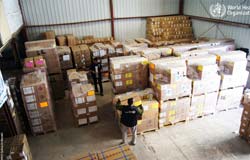 17 February 2016 -- Despite facing significant challenges as a result of the ongoing conflict in Yemen, WHO continues to respond to the increasing health needs of millions of people across the country. Since the beginning of the crisis, WHO has reached more than seven million people in 23 governorates through the provision of medicines, medical supplies, mobile medical teams and mobile clinics. More than five million children below the age of five have been vaccinated against polio, measles and rubella by WHO and partners. WHO has also provided more than 19 million litres of safe water and one million litres of fuel to health facilities and camps hosting internally displaced persons.
17 February 2016 -- Despite facing significant challenges as a result of the ongoing conflict in Yemen, WHO continues to respond to the increasing health needs of millions of people across the country. Since the beginning of the crisis, WHO has reached more than seven million people in 23 governorates through the provision of medicines, medical supplies, mobile medical teams and mobile clinics. More than five million children below the age of five have been vaccinated against polio, measles and rubella by WHO and partners. WHO has also provided more than 19 million litres of safe water and one million litres of fuel to health facilities and camps hosting internally displaced persons.
In Taiz governorate, where hundreds of thousands of people are virtually cut off from humanitarian aid, WHO has provided medicines and medical supplies for more than 250,000 beneficiaries, as well as safe water and fuel for health facilities. These supplies include 170 oxygen cylinders, dialysis solutions for 30,000 sessions, cancer treatment drugs, surgical items, intravenous fluids and anaesthetic supplies, as well as HIV antiretroviral treatments.
Eleven months into the conflict in Yemen, a collapsing health system has left more than 14 million Yemenis in need of healthcare services. Almost 25% of all health facilities have shut down due to damages, and there are critical shortages of staff and life-saving medicines. Attacks on health workers and health facilities occur with alarming frequency: in January alone, at least three health facilities were damaged as a result of ongoing violence.
The denial of humanitarian access to civilians in some parts of the country continues in direct violation of international humanitarian law, leaving almost five million people with only sporadic access to humanitarian and health supplies. While much has been done by WHO and partners, the access granted for limited deliveries of humanitarian supplies in Yemen is not enough. Unrestricted access to all people in need is urgently and immediately required.





